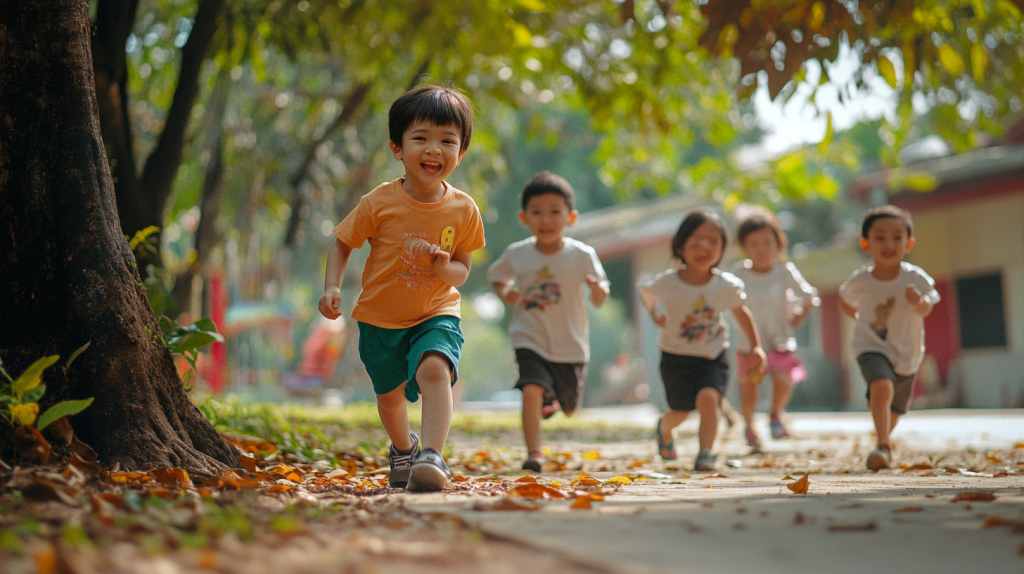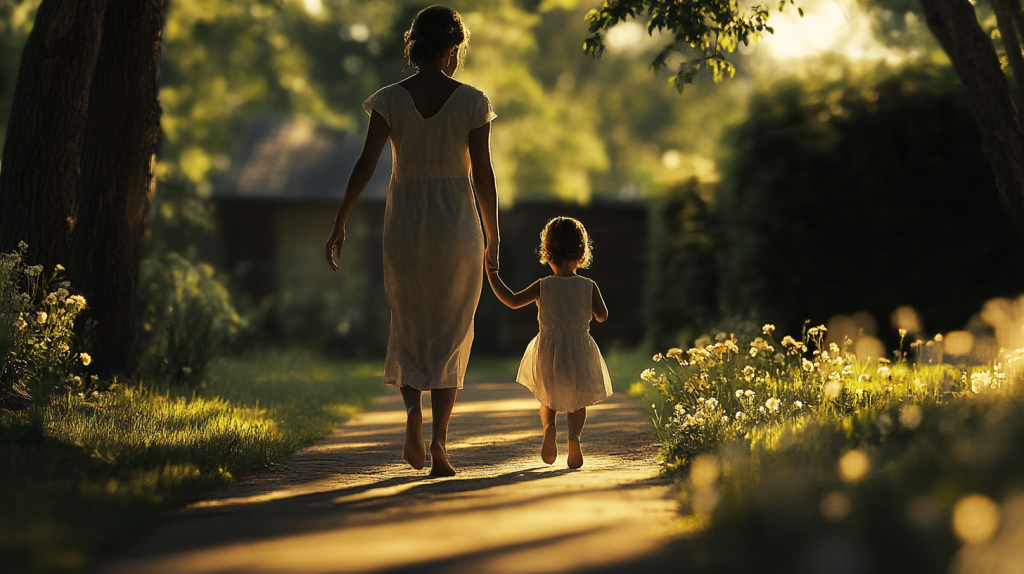Outdoor learning for preschoolers is one of the most effective ways to nurture curiosity, physical growth, and social development. Spending time outside allows children to connect with the natural world in ways that indoor environments simply can’t replicate. In Alexandria, VA, where green spaces and parks are plentiful, outdoor learning for preschoolers transforms ordinary playtime into meaningful educational experiences. It helps children build essential life skills, explore freely, and develop a strong foundation for lifelong learning.
Outdoor learning for preschoolers encourages hands-on discovery. When children explore gardens, play in open spaces, and engage in nature-based activities, they are not only learning about the environment but also developing independence and problem-solving abilities. The fresh air and freedom of movement stimulate their creativity and imagination while supporting both physical and emotional health. Through guided outdoor learning, preschoolers in Alexandria learn to appreciate nature, work collaboratively with peers, and grow into confident, curious learners who thrive in every aspect of development.
Benefits of Outdoor Learning
Outdoor learning for preschoolers provides a range of benefits that support early childhood development in natural and engaging ways. These experiences allow children to move, think, and interact with the world around them while strengthening their physical, emotional, and cognitive abilities.
Physical Health: Active outdoor play is essential for a child’s overall well-being. Running, jumping, climbing, and balancing during outdoor activities build strong muscles and improve coordination. Outdoor learning for preschoolers in Alexandria’s parks and playgrounds promotes fitness while reducing sedentary habits often linked to screen time. Exposure to sunlight helps regulate sleep cycles and provides natural vitamin D, which is vital for bone growth and a healthy immune system. As children explore and move, they also learn spatial awareness and develop confidence in their physical abilities.
Emotional Well-being: The connection between nature and emotional balance is profound. Outdoor learning for preschoolers helps reduce anxiety, calm restlessness, and increase attention span. Nature provides a soothing, unstructured environment where children can process emotions and practice mindfulness. In Alexandria’s peaceful outdoor settings, preschoolers can experience moments of joy, wonder, and relaxation. These moments strengthen self-esteem, encourage positive behavior, and teach resilience — skills that continue to serve them well into their school years.
Social Skills: Outdoor learning also provides an ideal setting for building social competence. Group activities such as team games, cooperative building projects, or outdoor storytelling help children learn communication, empathy, and teamwork. In Alexandria’s community play areas, children interact with peers from different backgrounds, building inclusion and respect. Through shared play, they learn to solve problems together, take turns, and lead or follow, depending on the situation. These experiences cultivate a strong sense of belonging and cooperation.
Cognitive Development: Outdoor environments stimulate curiosity and problem-solving. Every walk, garden, or playground can become a classroom for discovery. Outdoor learning for preschoolers introduces science, math, and observation skills naturally. Counting petals, studying insects, and predicting weather patterns encourage children to think critically. These experiences help develop focus, creativity, and reasoning. The ever-changing nature of outdoor play also enhances adaptability, teaching children to think independently and explore confidently.

Exciting Outdoor Learning Activities
1. Garden Exploration
Gardening is a wonderful way to teach children about nature’s cycles and the importance of care and patience. It allows them to understand where food comes from and how living things depend on one another.
Plant a Seed: Give each child a small pot, soil, and seeds. Teach them to plant, water, and nurture their seedlings. Outdoor learning for preschoolers through gardening fosters responsibility and patience as children observe their plants grow over time. Incorporate measurement activities, such as recording plant height, to introduce math concepts in a practical setting. Alexandria’s local community gardens are perfect for helping children engage with nature directly, where they can see pollinators at work and understand how ecosystems function.
Nature Scavenger Hunt: A scavenger hunt in a garden or park allows preschoolers to practice observation and critical thinking. Create a list of natural items like leaves, bugs, and flowers for them to find. This activity strengthens attention to detail and teaches about biodiversity. Encourage children to document their findings by drawing or creating a scrapbook. Outdoor learning for preschoolers thrives on exploration, and this activity enhances curiosity while blending creativity, science, and sensory play.
2. Nature Walks
Organize nature walks in local parks or trails. Alexandria, VA, offers numerous scenic spots perfect for a leisurely stroll with preschoolers. During these walks, encourage children to observe the environment, listen to birds, and collect interesting objects like stones or twigs. These walks can be an extension of classroom learning:
- Story Time in Nature: Bring along a storybook related to nature. After the walk, gather the children for a story session under a shady tree. This creates a magical experience, blending storytelling with the natural surroundings, and can spark discussions about the themes of the story.
- Sketching in Nature: Equip children with drawing pads and crayons. Ask them to draw what they see, promoting artistic expression and attention to detail. This activity can be followed by a “gallery walk” where children share their artwork, building confidence and communication skills.
3. Outdoor Science Experiments
Engage preschoolers with simple science experiments that can be conducted outside. These activities not only entertain but also educate:
- Water Play: Utilize water tables or basins to teach concepts of floating and sinking. Children can experiment with different objects and learn through trial and error. This sensory play can be expanded by introducing concepts of volume and measurement, using cups and containers of various sizes.
- Weather Observation: Create a weather chart and let children record daily weather conditions. Discuss patterns and changes, fostering an interest in meteorology. You can further this activity by having children create simple weather instruments, like wind vanes or rain gauges, enhancing their understanding of weather phenomena.
4. Play-Based Learning
Incorporate play-based learning into outdoor activities. Play is a natural way for preschoolers to learn and develop essential skills:
- Obstacle Course: Set up a simple obstacle course using cones, hoops, and ropes. This activity improves balance, coordination, and problem-solving abilities. Adjust the difficulty level to match children’s abilities, ensuring everyone is challenged and engaged without feeling overwhelmed.
- Sandbox Adventures: Provide various tools and toys in a sandbox to encourage creative play. Children can build structures, developing spatial awareness and fine motor skills. Introduce themes, such as “building a city” or “digging for treasure,” to add a narrative element to the play.
5. Outdoor Art Projects
Art projects conducted outside allow children to express themselves creatively while enjoying the fresh air:
- Nature Collage: Collect leaves, flowers, and twigs to create a collage. This activity teaches children about textures and colors found in nature. Display the collages in a “nature gallery,” celebrating each child’s creativity and providing an opportunity for reflection and critique.
- Sidewalk Chalk Art: Encourage children to draw on sidewalks or driveways with chalk. This fosters creativity and allows them to explore geometric shapes and patterns. Organize a “chalk art festival” where children can showcase their designs, promoting a sense of community and shared artistic expression.

Planning Safe Outdoor Activities
Safety and preparation are crucial to ensuring that outdoor learning for preschoolers remains both fun and secure. By planning ahead, educators and parents in Alexandria can create a positive, structured environment that allows for safe exploration.
Supervision: Always maintain adequate adult supervision during outdoor play. Involve volunteers or parents to achieve an ideal adult-to-child ratio, ensuring that every preschooler receives guidance and attention. Establish clear boundaries before starting activities to keep children within safe zones.
Weather Preparedness: Check weather forecasts in advance and plan flexible activities that can adapt to changes. Outdoor learning for preschoolers should continue even on cloudy days, but shelter options should be available in case of sudden rain. Ensure that all children wear appropriate clothing and footwear for the season.
Sun Protection: Make sunscreen and hats part of every outdoor routine. Teach preschoolers about sun safety to build good habits early. Outdoor learning in Alexandria’s sunny months should include shaded areas for breaks, helping prevent overheating.
Hydration and Snacks: Keep water available at all times and schedule regular hydration breaks. Outdoor play increases energy expenditure, so offer nutritious snacks that maintain stamina. Encourage children to rest between activities, balancing excitement with healthy self-regulation.
Conclusion
Outdoor learning activities provide preschoolers with invaluable experiences that foster growth in multiple areas. Whether it’s through gardening, nature walks, science experiments, or art projects, these activities offer a unique blend of education and fun. By prioritizing outdoor play, educators and parents in Alexandria, VA, and beyond can enrich the lives of preschoolers, nurturing their development and instilling a lifelong love for learning. As the seasons change, let’s embrace the great outdoors as a dynamic and inspiring classroom for young learners.
By incorporating these activities into daily routines, we not only promote physical and mental well-being but also encourage an appreciation for the natural world. This connection with nature can lead to a more sustainable mindset, as children learn the value of the environment and their role in preserving it. As we nurture these young minds, let’s remember that the lessons learned outdoors extend far beyond the classroom, shaping the citizens of tomorrow.
Contact Discovery Time Learning Center for Full and Part-Time Daycare
Are you looking for a nurturing environment for your preschooler? At Discovery Time Learning Center, we offer full and part-time daycare options that prioritize outdoor learning and development. Our experienced staff is dedicated to fostering a love for learning through engaging activities that promote physical, emotional, and cognitive growth.
Contact us today to learn more about our programs and how we can support your child’s early education journey. Let’s work together to create a bright future for your little one!



